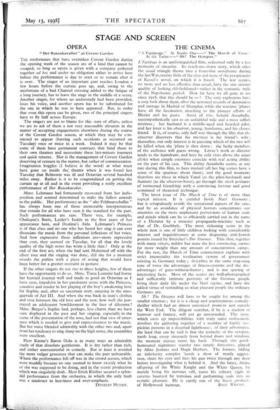STAGE AND SCREEN
OPERA
4$ Der Rosenkavalier" at Covent Garden THE misfortunes that have overtaken Covent Garden during the opening week of the season are of a kind that cannot be
escaped, so long as opera is given with a company gathered together ad hoc and under no obligation either to arrive here before the performance is due to start or to remain after it is over. The singer of an important part reaches London a few hours before the curtain goes up, and, owing to the misfortune of a bad Channel crossing added to the fatigue of a long journey, has to leave the stage in the middle of a scene. Another singer, for whom no understudy had been provided, loses his voice, and another opera has to be substituted for the one in which he was to have appeared. But, in order that even this opera can be given, two of the principal singers have to fly half across Europe.
The singers are not to blame for this state of affairs, unless we are to ask of them a not very reasonable altruism in the matter of accepting engagements elsewhere during the course of the Covent Garden season, at which they may be con- tracted to appear (barring such accidents as occurred on Tuesday) once or twice in a week. Indeed it may be that some of them have permanent contracts that bind them to their own theatres and necessitate these last-minute journeys and quick returns. Nor is the management of Covent Garden deserving of censure in the matter, but rather of commiseration. Imagination boggles (I believe is the word) at what must have gone on inside the', theatre when it was found last Tuesday that Belmonte was ill and Octavian several hundred miles away. Rather is it to be congratulated on getting the curtain up at all and in the event providing a really excellent performance of Der Rosenkavalier.
Mme. Lehmann had fortunately recovered from her indis- position, and seemed determined to make the fullest amends to the public. Her performance as the " alte Feldmarschallin " has always been one of those memorable interpretations that remain for all who have seen it the standard for the part. Such performances are rare. There was, for example, Chaliapin's Boris, Leider's Isolde in the first years of her appearance here, and Destinn's Aida. Lehmann's Princess is of that class and no one who has heard her sing it can ever dissociate the music from the personal inflexions of her voice. And how expressive those inflexions are—more expressive than ever, they seemed on Tuesday, for all that the lovely quality of the high notes has worn a little thin ! Only at the end of the first act, when she had sent Mahomed off with the silver rose and the singing was done, did she for a moment overdo the pathos with a piece of acting that would have been better for a greater restraint in gesture.
If the other singers do not rise to these heights, few of them
have the opportunity to do so. Mme. Tiana Lemnitz had borne her hurried journey well and made as good an Octavian as I have seen, impulsive in her passionate scene with the Princess, sensitive and tender in her playing of the boy's awakening love for Sophie, and, after an uncertain start, amusing in the mas- querade of Act III. And when she was back in man's clothes and torn between the old love and the new, how well she por- trayed an adolescent bewilderment in the face of dilemma ! Mme. Berger's Sophie had, perhaps, less charm .than we have seen displayed in the past and her singing, especially in the scene of the presentation of the rose, had not that ease of utter- ance which is needed to give real expressiveness to the music. But her voice blended admirably with the other two and, apart from her tendency to sing sharp on the high notes, the ensembles were excellent.
Herr Krenn's Baron Ochs is in many ways an admirable
study of that dissolute gentleman. It is dry rather than rich, and rather unresourceful in comedy. But at least it avoided the more vulgar grossness that can make the part unbearable. Where the performance fell off was in the crowd scenes, which were muddly because no one seemed to know exactly what he or she was supposed to be doing, and in the scenic production which was singularly drab. Herr Erich Kleiber secured a splen- did performance from the orchestra, in which the only fault was a tendency to heaviness and over-emphasis.
DYNELEY Hussey.














































 Previous page
Previous page